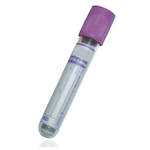Suitable Specimen Types
- EDTA Whole Blood
5 mL
Specimen Transport
First Class Post. Send whole blood.Sample Processing in Laboratory
UsualSample Preparation
Do not centrifuge.Sample Stability
UsualPurine Nucleoside Phosphorylase
General Information
Purine nucleoside phosphorylase deficiency, often called PNP-deficiency, is a rare autosomal recessive metabolic disorder which results in severe combined immunodeficiency.The disorder is caused by a mutation of the purine nucleoside phosphorylase (PNP) gene, located at chromosome 14q13.1. PNP is a key enzyme in the purine salvage pathway, and is required for purine degradation. Specifically, it catalyzes the conversion of inosine and guanosine to hypoxanthine. A deficiency of it leads to build up of elevated deoxy-GTP (dGTP) levels resulting in T-cell toxicity and deficiency. In contrast to adenosine deaminase deficiency (another deficiency of purine metabolism), there is minimal disruption to B cells.
Patient Preparation
NoneNotes
Mutation analysis and carrier screeningReference Range
Provided by Reference LabSpecifications
- EQA Status: In House
